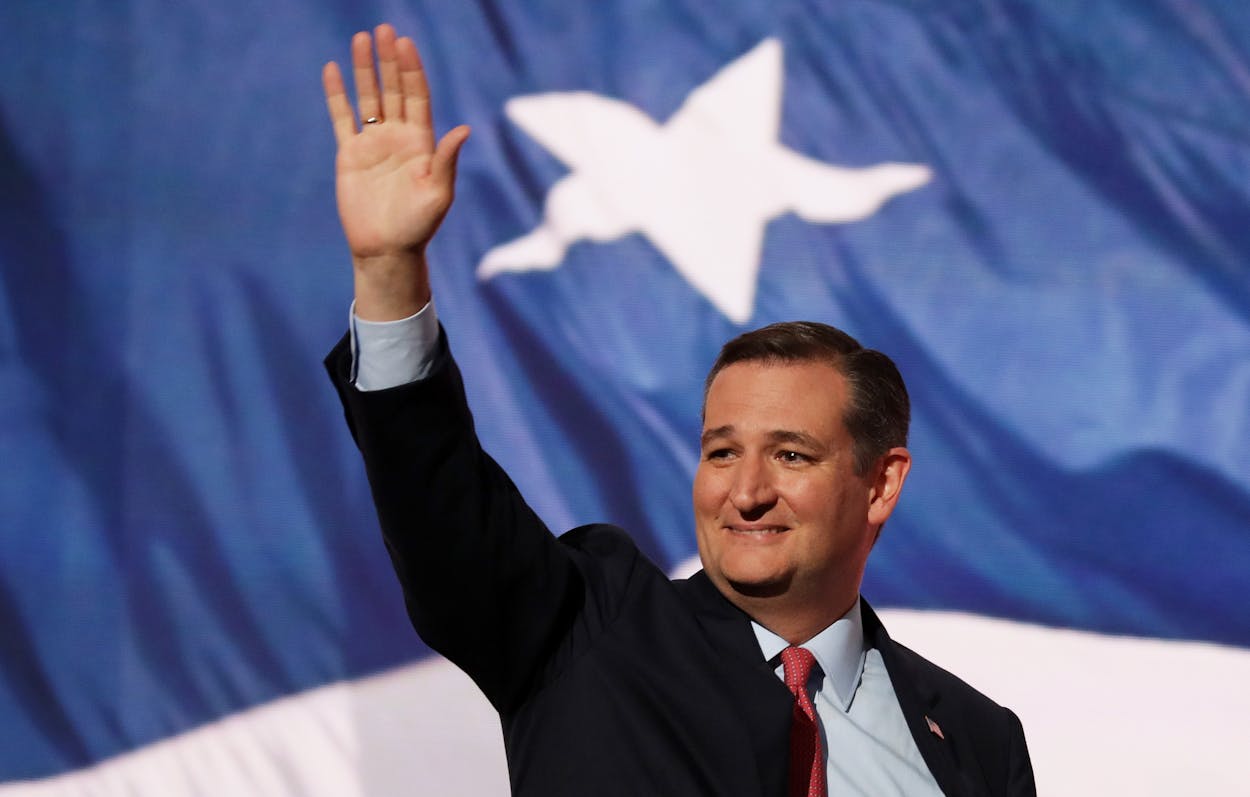It seems that some Texas Republicans aren’t too thrilled with their junior senator right now. That was clear yesterday morning when, after having publicly flouted Donald Trump’s efforts to bully all Republicans into submission during his remarks to the Republican National Convention on Wednesday, Ted Cruz appeared at the Texas delegation’s daily breakfast, where he faced some angry constituents and hostile questions. Some of his critics were, of course, Trump supporters; others, however, were Cruz supporters, and so the question of the day was whether Cruz, who is up for re-election to the U.S. Senate in 2018, will face political consequences back home.
This was a question I had been asking myself at the “thank you” event Cruz held for his delegates on Wednesday afternoon, hours before his controversial speech. Since suspending his own campaign for the nomination, in May, he had received no criticism for withholding his support for Trump. He had, in fact, been widely applauded by the Texas grassroots for pointedly avoiding any mention of the 2016 election during his speech at the state convention in May. “I couldn’t be prouder of him if he were my own son,” Robin Lennon, of the Kingwood Tea Party had told me then, during the standing ovation at the end of Cruz’s remarks. At that point, however, Trump was not yet the official Republican nominee. By Wednesday, he was.
The delegates who gathered at Tusker’s, on the edge of Lake Erie, were clearly underwhelmed by their party’s choice. While waiting in line for the venue to open all their murmurs had been mutinous, and inside the event, some delegates made it clear that they still preferred Cruz: they laughed as Trump’s plane appeared on the horizon, beginning its descent over the lake, and broke out into a “2020” chant. On the other hand, Nick Weidenkopf, an alternative delegate from Texas, told me that he had supported Cruz in the primary but was content with the party’s nominee. “The main job of the president is international relations,” he explained, and the Republican nominee would be an effective ambassador for America’s interests. “Everybody’s afraid of Trump.” A number of members of the Texas delegation, it would appear, were in a similar camp: pro-Cruz, but not necessarily anti-Trump; further, as Republicans, they are anti-Clinton.
That would explain the anger at Thursday morning’s breakfast. The choice voters are facing is not a binary one. The outcome, realistically, is. It would be going too far to say that Cruz, by shivving Trump in such a public fashion, had helped Clinton; but he certainly hadn’t helped Republicans defeat her. And, on Thursday, that appeared to be weighing on many Texans’ minds. “I think it would be best for all concerned if Ted Cruz supported Donald Trump,” Steve Munisteri, the former chair of the Texas GOP, told me yesterday afternoon in Cleveland, adding that he thought there was still time to repair relations. “You can be not-okay with some of a candidates’ positions and still more okay with the sum total than the alternative,” he said.
Some delegates, however, clearly disagreed. Dianne Williams was slightly chagrined that she had been quoted, that morning, expressing herself in such strong language; per a CNN chyron, she had told Trump to “shut up his ugly mouth.” She didn’t regret the sentiment, however, or what Cruz had done the night before. “There were 17 candidates. Sixteen of them, we could have cheered.” Since the lone exception had won, however, she recalled a lesson her father had taught her: “Wrong’s wrong, if everybody’s doing it; right’s right, if nobody is.”
That was Thursday, of course, and everyone’s emotions were running high. It’s too soon to say how things will shake out in the months and years to come, and whether Texas conservatives, like Williams, will conclude that Cruz can be forgiven for taking a principled stand. But the window for repairing relations, that Munisteri was hoping for may already have closed—Trump declared as much this morning, and he is, supposedly, a man of his word.







